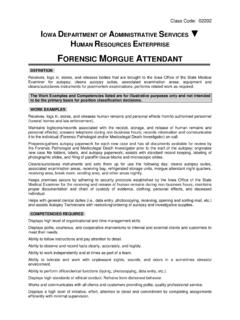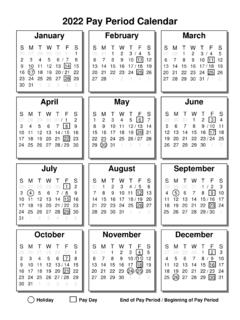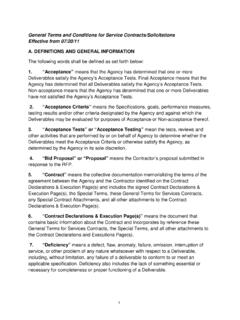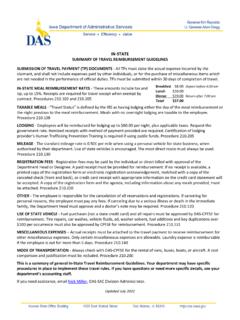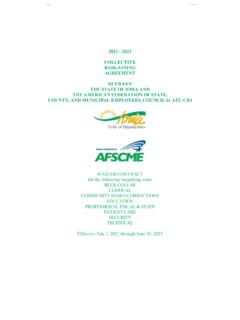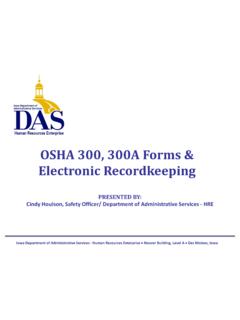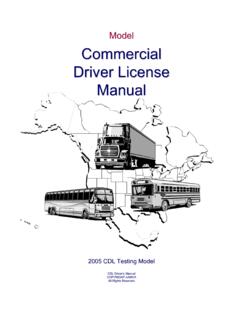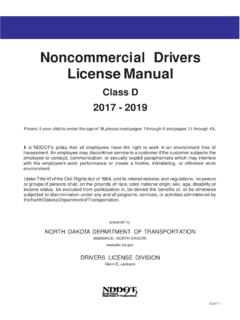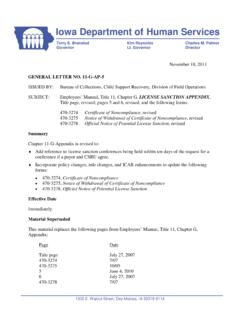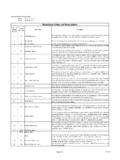Transcription of EQUAL OPPORTUNITY, AFFIRMATIVE ACTION, AND …
1 Revised 4/15 Chapter 2 M&S manual 1 Section SECTION STATE OF iowa EEO, AA, AND anti - discrimination policy Last Update: 4/2015 State of iowa EQUAL OPPORTUNITY, AFFIRMATIVE ACTION, AND anti - discrimination policy For Executive Branch Employees NOTIFICATION AND EFFECTIVE DATE All executive branch employees will be required to read this EQUAL Opportunity, AFFIRMATIVE Action, and anti - discrimination policy , and will be expected to sign an Acknowledgment indicating that the policy was read and fully understood by the employee. This revised policy shall become effective December 10, 2010. A. GENERAL STATEMENT OF policy It is the policy of the executive branch of state government in the State of iowa to Provide EQUAL employment opportunity within state government to all persons. ( iowa Code 19B.) The intent of this policy is to ensure that individuals are not denied EQUAL access to state employment opportunities because of their race, creed, color, religion, sex, national origin, age, physical or mental disability, sexual orientation, or gender identity, consistent with applicable state and federal policies and regulations.
2 It is also the policy of the executive branch of state government in the State of iowa to apply AFFIRMATIVE action measures to correct the underutilization of females, minorities, and persons with disabilities in the state employment system whenever remedial measures are appropriate. B. DISCRIMINATORY HARASSMENT IN VIOLATION OF iowa CODE CHAPTERS 216 AND 19B AND APPLICABLE FEDERAL STATUTES Harassment of employees based upon their race, creed, color, religion, sex, national origin, age, physical or mental disability, sexual orientation or gender identity is a violation of the iowa Civil Rights Act ( iowa Code chapter 216, as amended). Other laws also prohibiting discriminatory harassment in one or more Revised 12/10 Chapter 2 M&S manual 2 Section of specified covered areas include: iowa Code Section , Title VII of the Civil Rights Act of 1964, as amended; the Age discrimination in Employment Act of 1978, as amended; and the Americans with Disabilities Act of 1990.
3 Examples of discriminatory harassment based on the employees protected status include, but are not limited to: 1. Abusing the dignity of an employee through insulting or degrading remarks or conduct. 2. Threats, demands, or suggestions that an employee s work status is contingent upon submission to harassment. 3. Subjecting an employee to demeaning or degrading activities in order to gain co-worker acceptance, , hazing. C. SEXUAL HARASSMENT Sexual harassment is a violation of both federal and state statute. Harassment on the basis of sex is a violation of Section 703 Title VII of the Civil Rights Act of 1964 (42 Sec. 2000e et seq.) as amended and iowa Code Sections and 216. Sexual harassment based on real or perceived sexual orientation or gender identity is a violation of iowa Code Section 216. "Unwelcome sexual advances, requests for sexual favors, and other verbal or physical conduct of a sexual nature constitute sexual harassment when (1) submission to such conduct is made either explicitly or implicitly a term or condition of an individual's employment, (2) submission to or rejection of such conduct by an individual is used as the basis for employment decisions affecting such individual, or (3) such conduct has the purpose or effect of unreasonably interfering with an individual's work performance or creating an intimidating, hostile, or offensive working environment.
4 " Within iowa Code section , "sexual harassment means persistent, repetitive, or highly egregious conduct directed at a specific individual or group of individuals that a reasonable person would interpret as intentional harassment of a sexual nature, taking into consideration the full context in which the conduct occurs, which conduct threatens to impair the ability of a person to perform the duties of employment, or otherwise function normally within an institution responsible for the person's care, rehabilitation, education, or training." Examples of sexual harassment, in addition to discriminatory harassment previously described, include, but are not limited to: 1. Unwelcome sexual advances. Revised 12/10 Chapter 2 M&S manual 3 Section 2. Hostile conduct based on the person s sex, sexual orientation, or gender identity. 3. Requesting or offering sexual favors in return for job benefits.
5 4. Actions such as cornering, patting, pinching, touching or brushing against another person s body that are sexual in nature. 5. Open speculation or inquiries about another person s sex life. 6. Jokes, remarks, or innuendos that are sexual in nature or based on real or perceived sexual orientation or gender identity about another person, or about men or women in general. 7. Displaying sexually explicit material in the work place. 8. Conditioning work benefits on submission to sexual advances, tolerance of a sexually hostile work environment or giving preferential treatment because of another person s submission to sexual advances, or tolerance of a sexually hostile work environment. Sexual harassment can take place between (a) any two state employees, (b) a state employee and a non-state employee, including contractors, and (c) between a state employee and a visitor, guest, client, patient, inmate, or resident.
6 D. DISCRIMINATORY PRACTICES IN VIOLATION OF THE AMERICANS WITH DISABILITIES ACT OF 1990 A person with a disability is a person who has a physical or mental impairment that substantially limits a major life activity, or has a record of such impairment, or is regarded as having such impairment. "Major life activities include functions such as caring for oneself, performing manual tasks, walking, seeing, hearing, speaking, breathing, learning, and working. A qualified person with a disability is one who meets the legitimate job requirements and is able to perform the essential function of the position with or without reasonable accommodations and without being a direct threat to the health or safety of themselves or others. Essential functions are absolute requirements for producing critical job results/outputs. Essential, by definition, means indispensable, vital, necessary, or related to the essence of the job.
7 It does not include marginal functions or duties performed. As such, departments are not required to provide reasonable accommodations that would result in fundamental alterations in the nature of the work to be performed. The State of iowa and its departments, agencies and other instrumentalities and all their employment practices, services and programs shall comply with the requirements of the ADA. The ADA requires, in part, that the State of iowa : Revised 12/10 Chapter 2 M&S manual 4 Section 1. Make reasonable modifications in policies, practices, and procedures that deny EQUAL access to individuals with disabilities, unless fundamental alteration in the program or an undue hardship would result. 2. May not refuse to allow a person with a disability to participate in a service, program or activity simply because the person has a disability. 3. Provide programs and services in an integrated setting unless separate or different measures are necessary to ensure EQUAL opportunity.
8 4. Prohibit requirements that tend to screen out individuals with disabilities, such as requiring a driver s license as the only acceptable means of identification. 5. Eliminate unnecessary eligibility standards or rules that deny individuals with disabilities an EQUAL opportunity to enjoy their services, programs or activities unless necessary to the provisions of the services, program or activity. 6. Impose safety requirements only when they are necessary for the safe operation of the program in question, such as requirements for eligibility for drivers licenses if they are based on actual risks and not on mere speculation, stereotypes, or generalizations about individuals with disabilities. 7. Ensure that individuals with disabilities are not excluded or limited from participation in services, programs, and activities because buildings are inaccessible. 8. Provide services, programs and activities offered in the facility to persons with disabilities through alternative methods, if physical barriers are not removed.
9 E. COMPLAINT REPORTING PROCEDURE Any person who feels that he or she has been denied an employment opportunity or has had the terms and conditions of their employment adversely affected because of race, creed, color, religion, sex, national origin, age, physical or mental disability, sexual orientation or gender identity has the right and is encouraged, to file a complaint with the person s department, pursuant to the department s complaint procedure. A person may also file a complaint with the iowa Civil Rights Commission or the appropriate federal enforcement agency. (For sexual orientation or gender identity, protection is offered under the State of iowa statute only.) There shall be no discrimination or retaliation against an individual because he or she files a complaint or who aids another individual in filing a complaint. An employee who has reason to believe that he or she has been retaliated against because of participation in an investigation of a discrimination complaint may also file a charge with the iowa Department of Administrative Services Human Resources Enterprise, the iowa Civil Rights Commission, or the EQUAL Employment Opportunity Commission, whichever is appropriate.
10 Revised 12/10 Chapter 2 M&S manual 5 Section Any person who believes that she or he has been the victim of discrimination under this section, or who has a concern about potential violations of this section, is directed to bring the matter to the attention of his or her immediate supervisor, appointing authority, or their designees, in accordance with the department s established complaint procedure. If the concern or complaint involves the employee s immediate supervisor, the employee is encouraged to file the concern or complaint with the next highest supervisor, or, in the alternative, to the Director of the iowa Department of Administrative Services. Department directors shall promptly investigate all complaints. Each agency shall take final agency action in response to a complaint. Corrective action shall be taken immediately to remedy violations of this policy , whenever warranted, up to and including the discharge of parties whose conduct violates this policy .


